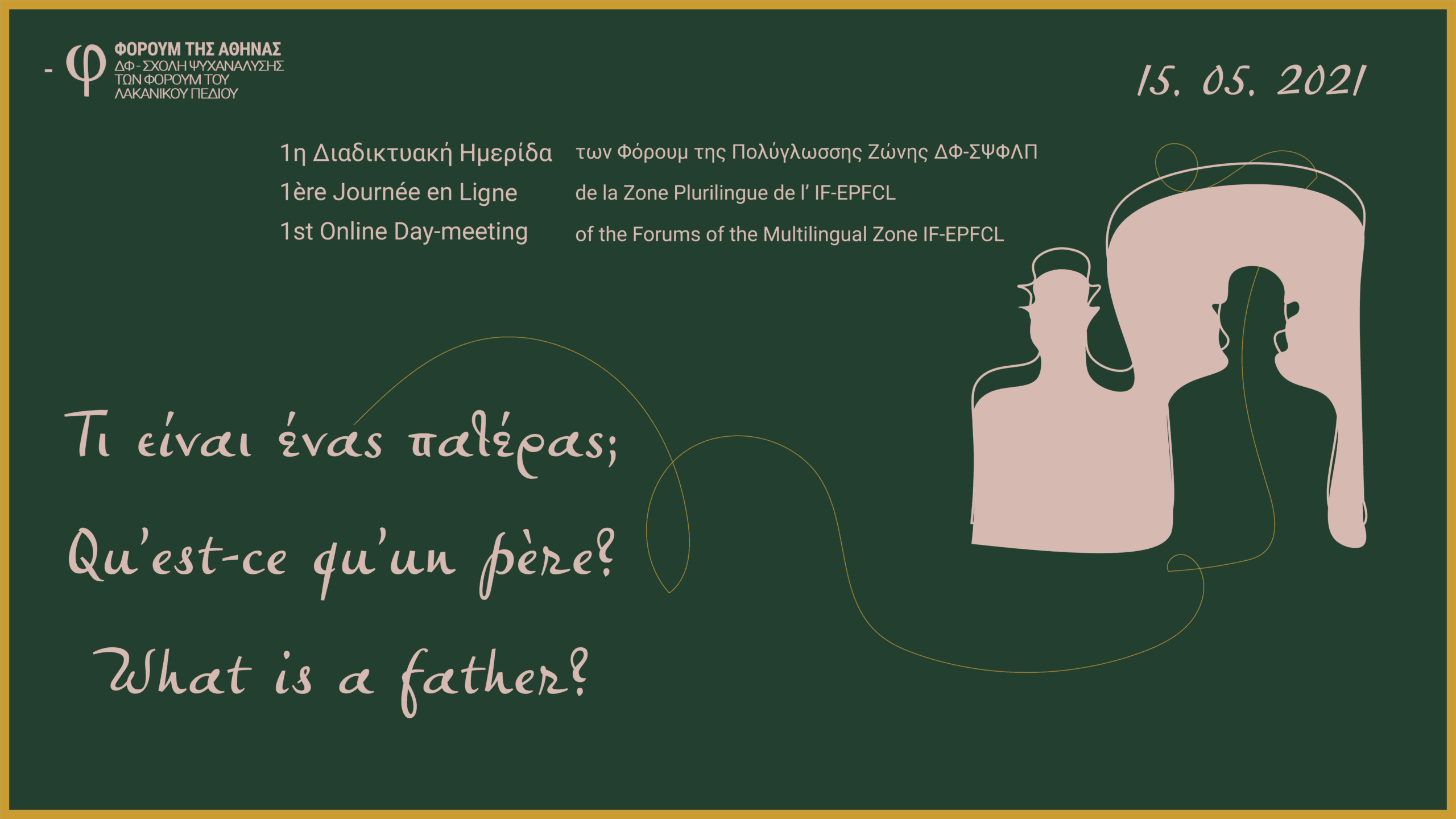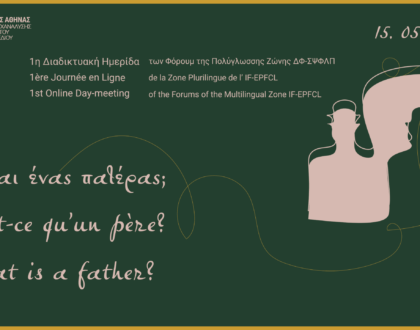Name of the Freud

Predule FLF of Turkey
1st online Day-Meeting of the Forums of the Multilingual Zone IF-EPFCL
We decided to follow the Anxiety seminar of Lacan for this year’s work in the Forum of Turkey. Since this seminar has been a founding text on the birth of Lacanian Psychoanalysis, it has been interesting to conduct the theoretical reading of the seminar by establishing a link with the events which led to the birth of Lacanian psychoanalysis.
By concluding the Anxiety seminar with the speech known as “From object a to the names of the father” on 3 July 1963, he made an introduction to the seminar of the following year. In his speech, he emphasized structuring lack by making transition from the Name-of-the-father to the names-of-the-father. (1) Afterwards, he gave a speech titled “Names of the Father” on 20 November 1963 where he informed his audience that he would not be able to hold the seminar as planned which was supposed to continue throughout the year (2). This speech, which can be received as valedictory and in which we could feel his reproach and fragility, was focusing on the question of “what is a father?”. The moment where Lacan begins to ask the question of the father with great earnestness corresponds historically to the birthplace of Lacanian psychoanalysis. In this respect, the theme of the Forum of Athens’s Plurilingual Zone is a continuation of our work this year.
Freud tried to answer the question of what a father is with the mythical father in Totem and Taboo. This father is the primal father. He possesses all the jouissance and his power takes its authority of his own existence like a first cause. That’s why the question of existence is obstructed. Lacan says that the cause comes after the desire, and that desire itself cannot be its own cause. The subject comes before the question of existence (3). The cause of desire is lack, and without this lack the question of existence does not arise. The primal father mentioned by Freud is exempt from the question of the cause. As a matter of fact, Freud had to kill the primal father in order to talk about the father, although Lacan says that Freud’s attempt was still an attempt to guarantee the existence of the father at all costs… (4)
The primal father that Freud attempted to kill with his myth is pre-cultural and a creature of an infinite power. We can easily get the idea from the very first lines of Totem and Taboo that this father is a man. However, it is not possible to talk about the subject here, or whether the subject is a man or a woman. Sexuation is a subjective division. This primal father who belongs to a pre-subjective myth, is omnipotent and not subject to sexuation and subjectivity.
Later, in Freud’s Moses and Monotheism text, unlike the bestial father in Totem and Taboo, a divine father appears, and this Father is needed as a defense against the threat of femininity. Here, oedipal anxiety is directed to the mother, not to the father. After Totem and Taboo, Freud tried to find an answer, which incorporates subjectivity, to the question of “What is a father?” The Father mentioned in this text stands between the woman and the man because of his divinity. Lacan mentions in his Encore seminar that God as a face of the Other is between man and woman. (5) According to Lacan, this second myth in The Moses and Monotheism can be read as an inclusion of the symbolic father function in subjectivity.
The death of the father does not eliminate the law, but rather makes it stronger. In Oedipus myth, murder of the father does not pave the way for sexual intercourse with the mother, on the contrary, it establishes the law of the prohibition of incest. This is the paternal function. In order for the son to ascend the throne, he must kill his father and thus encounter castration. The father, who is the agent of castration, is the Real Father (6), and this father’s position is impossible to reach. Lacan says “The Real Father is nothing other than an effect of language, and doesn’t have any real other.” (7). He is the agent of castration which is the effect of signifiers on sexual relationship which is impossible. Father, as a name, produces the prohibition of incest by the castration. (8)
Later in the RSI seminar Lacan formulates the-Name-of-the-Father in terms of the Imaginary, the Symbolic, and the Real and he talks about its function of making the Borremean knot. He emphasizes that it has a function of separating the Imaginary, the Symbolic and the Real from each other as a fourth knot. The function of the father is naming and it is needed to keep the Imaginary, the Symbolic and the Real distinct from each other. Moreover, as in the Borromean knot the-Names-of-the-Father can be indefinite.(9)
What is left to the psychoanalysis from the death of the father is his name. The name marks the thing which will later become the subject. However, this marked being does not yet know about it. Questions about this signifier that marks the being arise after the birth of the subject. When Lacan talked about the name’s mastery, we should hear it as analytical discourse being possible only through something that is unnamed. The events that led to the birth of Lacanian psychoanalysis are synchronous with Lacan’s opening of a long discussion about this unnamed thing. In his speech on November 20 (10), he emphasizes that Freud’s name has become more and more non-functional day by day. The function of the things, clustering around a Name which has become non-functional every day, is leaving behind the object a. Thus, analytical discourse and clinic of pas-tout became possible.
Begüm Topaloğlu & Sinan Tayfur
Members of the Turkish Forum of the Lacanian Field
Bibliography:
- (1)Lacan, J., Seminar Anxiety, op. cit., lecture of July 3, 1963, p.336.
- (2)Lacan, J., (2012), Baba-nın-Adları, (Ersan.M., Trans.), (Original work published 1963), p.62.
- (3)Lacan, J., (2012), Baba-nın-Adları, (Ersan.M., Trans.), (Original work published 1963), p.68.
- (4)Lacan, J., Seminar The Foundation of Psychoanalysis, 1964
- (5) Lacan, J., Seminar Encore, op. cit., lecture of February 20, 1973.
- (6)Lacan, J., Seminar The Other Side of Psychoanalysis, op. cit., lecture of March 18, 1970.
- (7)Lacan, J., Seminar The Other Side of Psychoanalysis op. cit., lecture of March 18, 1970, p.153.
- (8)Lacan, J., Seminar R.S.I. , op. cit., lecture of February 11, 1975.
- (9)Lacan, J., Seminar R.S.I. , op. cit., lecture of April 15, 1975.
- (10)Lacan, J., (2012), Baba-nın-Adları, (Ersan.M., Trans.), (Original work published 1963), p.96.

